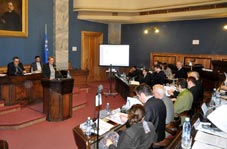The EU wants to discuss every problem
By Etuna Tsotniashvili
Wednesday, March 31

In her welcoming speech Deputy State Minister for European and Euro-Atlantic Integration Tamar Beruchashvili, on behalf of the Government of Georgia, spoke about the reforms being undertaken by the Government of Georgia, outlining progress in the struggle against corruption, the conclusion of a Free Trade Agreement with the EU and the importance of visa facilitation and the participation of Georgia in the Eastern Partnership Programme.
Beruchashvili also talked about August 2008 war and thanked the guests for the firm position they had taken during the Russian aggression. She said that the EU Monitoring mission in the conflict zones had become crucially important in trying to prevent any escalation of the conflict since the OSCE and UN Missions in Georgia were blocked by the Russian Federation. The Deputy Minister hoped that Georgia's desire to integrate with Europe will receive more support from the EU and will facilitate the establishment of firm European democracy in Georgia.
In his speech Head of the EU Delegation's Political, Economic and Information Service in Georgia Robin Liddell expressed the EU's continued support for the territorial integrity and sovereignty of Georgia and spoke in detail about the importance of Georgia-EU relations concerning various projects. The Government's new strategy regarding Abkhazia (Georgia) and South Ossetia (Georgia) and the core aspects of EU-Georgian relations were also considered.
Deputy Chairman of the Georgian Parliament's Committee on Foreign Relations Giorgi Kandelaki described the state of affairs in the occupied regions of Georgia and around the administrative borders and explained the Law on the Occupied Territories. He also spoke of the role and place of the EUMM in Georgia.
The EU representatives again reiterated that the presence of the EUMM in Georgia is essential. The Co-Chair of the meeting from the EU side, Milan Cabrnoch, stated that the delegation will visit the EU monitors and obtain information from them about both sides' fulfillment of their obligations under the six-point ceasefire agreement. He also highlighted that the forthcoming local elections will be a test of democracy in the country.
“The best way we can cooperate within this Committee is to discuss every problem Georgia has. We do support the new waves of democratic reforms being carried out in Georgia. As for the local elections, these are a kind of indicator for Georgia and the international community is watching them with huge interest,” Cabrnoch stated, adding that Russia`s actions and its violation of the ceasefire agreement are unacceptable. "Therefore, I think the EU mission should continue its monitoring here," he added.
The Head of the Permanent Parliamentary Delegation to the EU–Georgia Parliamentary Cooperation Committee, Davit Darchiashvili, spoke in detail about the democratic reforms initiated by the President, the measures taken to overcome the economic crisis, the state policy towards IDPs, its steps to combat poverty, pension increases and the participation of Georgia in the Eastern Partnership Programme. He noted that Georgia attempts to separate political and economic issues in its relations with Russia and one example of this is the opening of the Larsi checkpoint. Minister of Refugees and Accommodation Koba Subeliani also presented a report.
The delegation will meet representatives of the EUMM, NGOs, the Government and opposition, media representatives and the Central Election Commission during the visit.
